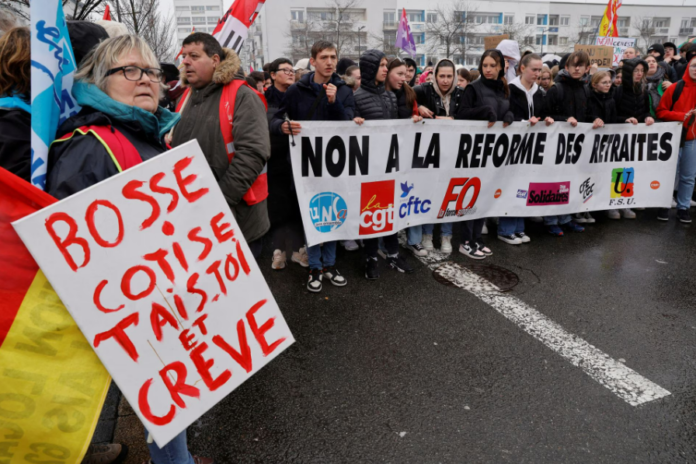French unions are leading another round of strikes and protests against President Emmanuel Macron’s pension reform on Thursday, capitalizing on broad public support for a movement that has caused trash to pile up on the streets of Paris and sporadically turned violent, according to Bloomberg.
The bill to raise France’s minimum retirement age to 64 from 62 has already passed parliament, but unions are betting they can still force a U-turn. They continue to rally record turnouts at nationwide marches, tapping into rising anger after the government dodged a National Assembly vote by using a provision known as Article 49.3.
Protesters are also seeking to maintain pressure ahead of a ruling by the Constitutional Council on the conformity of the reform due on April 14.
“We’re in a social crisis, we have a democratic crisis, there is a problem, and the president has the solution in his hands,” Laurent Berger, leader of the CFDT union, said on RTL radio.
French rail operator SNCF said to expect disruption on many lines, and the DGAC civil aviation authority asked airlines to reduce flights by 20% at some regional airports including Marseille-Provence and Bordeaux. Garbage collectors have returned to work in Paris but plan to resume open-ended strikes April 13.
The conflict over pensions is threatening to engulf Macron’s agenda of pro-business economic reforms that he has led since first taking office in 2017.
Backing down at this late stage of the legislative process would be a hobbling political defeat, yet going ahead risks cementing his lack of a majority in parliament and destroying relations with unions that the government needs to work with on future overhauls.
The political debacle is also benefiting the far-right National Rally party. According to one survey by Ifop of 1,105 adults March 30-31, if there were a presidential election this weekend, perennial nationalist candidate Marine Le Pen would lead the first round of voting against any of Macron’s allies with as much as 36% of the vote. He cannot run for a third term in 2027.
The government and unions are now focused on the decision of the Constitutional Council, which will also rule on an opposition-backed request to put the bill to a referendum. However, unless it rejects the reform outright, the conflict over pensions will likely continue — at least until Macron enacts the changes later this year.
“A legal decision would add legitimacy to the law, but it wouldn’t erase political disagreements,” Labor Minister Olivier Dussopt said on BFM TV on Thursday.
Prime Minister Elisabeth Borne called a meeting with the leaders of France’s main unions on Wednesday in an attempt to discuss future changes to labor laws. They walked out after less than an hour as she refused their demands to drop the pension reform.
Macron’s government says raising the pension age is vital to boost employment rates and halt the build-up of deficits in the massive public retirement system as the population ages.
Unions say changing the age thresholds to claim a full pension will disproportionately penalize the least well-off and that there are other options to balance the system, including higher taxes on business and the wealthy.


